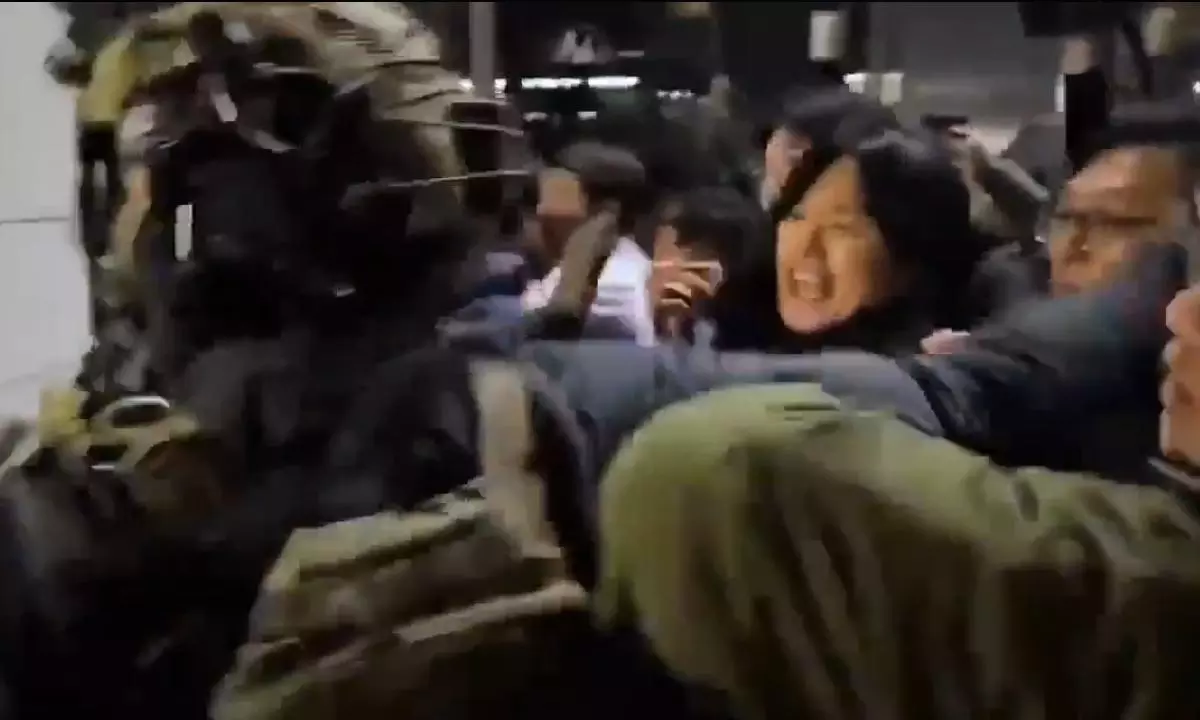
Explained: Why was martial law imposed, revoked in South Korea; what now?
South Korea has in the past been subject to authoritarian rule by strongmen and military leaders who imposed martial law several times to crack down on popular protests

South Korea is in a state of uncertainty after its president imposed martial law on Tuesday night (December 3) and was then forced to revoke it within just six hours on Wednesday morning (December 4) after the nation’s National Assembly unanimously voted against it.
Why was martial law imposed?
At around 10.30 pm local time, President Yoon Suk Yeol declared martial law in an unannounced TV address to the nation.
President Yoon accused his country’s main opposition party of sympathising with North Korea, and of “anti-state activities”. He also referred to the motion passed by the main opposition Democratic Party, which has a majority in Parliament after recent general elections, to reject a government budget proposal and impeach top prosecutors.
Also Read: Martial law lifted in South Korea amid calls for President’s resignation
What were the implications of martial law?
The president has the constitutional right to declare martial law in an emergency, granting the military a temporary right to rule the country.
Yoon’s military decree banned all political activities, including rallies, protests or any actions by political parties. It also prohibited any attempts at “subversion or to manipulate public opinion”.
How did the country respond?
The country was shocked at the sudden announcement of martial law, bringing back bad memories of authoritarian rule before the 1980s.
In an immediate response, members of the public gathered in front of the parliament building in the capital Seoul, where soldiers told them they could be arrested without warrants. Protesters carried flags and signs and called for impeachment of President Yoon.
Furious lawmakers rushed to the parliament and forced their way past soldiers who had been deployed to prevent entrance to anyone.
Also Read: South Korea declares martial law; protests rock nation
In an extraordinary emergency late-night meeting of the National Assembly, those present passed a unanimous vote to block the presidential decree, which President Yoon was legally bound to obey.
Even members of Yoon’s own party joined the opposition in opposing the imposition of martial law.
The head of Yoon’s party went a step further and apologised to the public for the president’s action and demanded an explanation from him.
How did President Yoon react?
President Yoon had no other option but to submit to public pressure and the unanimous vote passed by the National Assembly against his decree.
At about 4.30 am, six hours after imposing martial law, Yoon announced that he was complying with the parliament’s vote and was lifting martial law.
Also Read: North Korea's Kim supervises firing drills simulating preemptive attacks on South Korea
He however again accused the opposition of frustrating his government’s moves and urged the lawmakers to stop their “legislative manipulation”.
Soon after, his cabinet voted to lift the decree.
Why did President Yoon take the extreme step?
The opposition party won a majority in parliament in general elections in April this year, and it was seen as a vote against President Yoon himself. He has been involved in a number of scandals and controversies since he took office in 2022, and his popularity has suffered.
The opposition parties have prevented him from passing legislation to reduce taxes and to ease business regulations, promises he had made during his election campaign.
Yoon was also frustrated with the opposition’s moves to impeach top government officials whom he had appointed. They were especially keen to impeach several top prosecutors, who they accused of failing to indict Yoon’s wife in cases of stock manipulation.
What does the future hold?
It is not clear what will be the fate of President Yoon. His chief of staff and more than 10 senior secretaries to the president have submitted their resignations.
The main opposition party has threatened to initiate impeachment proceedings if Yoon does not resign from the president’s post.
The head of Yoon’s own party has also demanded that the defence minister should step down for recommending martial law.
Also Read: South Korea launches 2nd military spy satellite amid animosities with North Korea
The country’s largest employees’ union have threatened an indefinite general strike until President Yoon resigns.
South Korea has in the past been subject to authoritarian rule by strongmen and military leaders who imposed martial law several times to crack down on popular protests. The country’s citizens do not want to return to dictatorial rule, and that explains the response by the public and lawmakers to President Yoon’s declaration of martial law.

